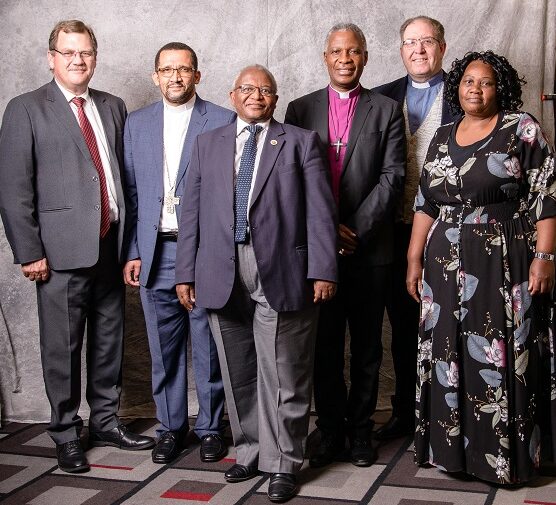Mthatha, 5 June 2020
The main challenge facing South Africa now is not the issue of legality or rationality (although these are very important and valid principles in our constitutional democracy) – but of saving lives, caring for the sick and feeding the hungry.
Therefore the ultimate legitimacy test for all measures dealing with the impact of Covid 19 is: does it enhance our capacity, efficiency and commitment as a country to care for those most affected: the sick, the hungry and the most vulnerable in our society?
This principle was recently endorsed by the statements of Pope Francis: “We will not find the Lord unless we truly accept the marginalised. Truly the gospel of the marginalised is where our credibility is at stake, is found and is revealed.”; as well as the Executive Committee of the World Council of Churches (WCC): ”Churches and faith communities are called to accompany the most vulnerable people and communities, as well as to be in solidarity with each other. Our Lord Jesus Christ shows us with his life, teachings and actions that concern, care and compassion surpass all boundaries, and in this moment of crisis, fear and division it is our calling as Christians to bring hope and healing, for the transformation of society.
Immediate and long-term action and collaboration
Any obstacles hindering collaboration between all sectors (faith communities, government, private sector, civil society) to mobilize resources (including international resources), services and especially volunteers must be addressed urgently. This must be reviewed systematically and formally – mere “consultations” are not enough, since it does not change the way programmes are implemented.
In this context, the challenge for government is not to attempt to control and deliver all services on its own, but rather to act as true servants of the public – as facilitator, coordinator and to support the numerous initiatives and proven networks of capacity within faith communities, NGOs, civil society and business – that have the capacity to implement such programmes.
The consequences of Covid 19 demands immediate action – but it also demands a re-think and design of how different sectors could collaborate more meaningful to deal with the longer- term impact and consequences in the years to come.
Appreciation and acknowledgement
- We appreciate the fast response of government to implement national measures to curb the spread of Covid 19;
- We appreciate and honour the many frontline workers in the health and community sector – that work hard despite the risks to them and their families, to care for those that are seriously sick;
- We appreciate and honour the role of the majority of police and defense force personnel who execute their work with discretion – serving the public in a dignified manner;
- We acknowledge and appreciate the good will by numerous individuals, churches, different faith groups, businesses, farmers and farming associations – that substantially contribute their own resources (and time) to serve those in need of food.
- We acknowledge and treasure the good cooperation between different faith groups, national, regional and local ecumenical networks for their compassion and care work in this challenging time;
Serious concerns
- The number of people with no or insufficient food has increased enormously, there is a need for effective cooperation between government, faith communities and civil society to ensure that food is delivered to hungry people.
- There are far too many serious incidences of police or defense force violence in the execution of their duty to enforce lock down measures –causing harm, death and criminalizing many South Africans. These cases should be investigated – accountability and justice must prevail.
- The consequences of the additional tensions and stress in society – resulting in an increase of incidences of violence in families (especially against women and children) needs to be addressed by church and faith leaders, as well as social services and law enforcement agencies.
- There are far too many fraudulent and self-serving schemes (in all sectors) to exploit the current crisis for self-enrichment – robbing valuable resources that should benefit the most vulnerable in society.
- This is not the time for political parties to serve sectional interests as this weakens our national effort and good will to stand together in the current situation.
Special measures to be prioritized
- We need to ready ourselves to deal with the peak of Covid 19 and learn from other parts of the world that are experiencing major outbreaks of this pandemic – how to effectively respond to the outbreak in a holistic and humane way.
- Community feeding schemes (soup kitchens; food parcels) should be scaled up drastically to create food security for vulnerable families – whilst adhering to special measures to curb the spread of the Covid 19;
- Supporting schools in all efforts to normalise education – on all levels (including Early Childhood Development Centres)
- It is urgent to formalise national agreements between faith networks and government – to ensure that substantial, additional international resources to curb the effects (health, social and economic) of Covid 19 could be mobilized for South Africa. This current window of opportunity will be missed if we do not respond fast; This applies especially to health (HIV/AIDS, TB, etc.) and social programmes.
Bishop Sithembele Sipuka
Chairperson: NCLC
President of the Southern African Catholic Bishops’ Conference (SACBC)
Convenor: Father R. Menatsi
Secretariat: Dr R Koegelenberg (renier@cddc.co.za)
Enquiries: Tel.: +27 21 880-1734, Cell: +27 83 625-1047
NCLC Think Tank participants
- Bishop Dr Sithembele Sipuka, Bishop of Mthatha, President: Southern African Catholic Bishops’ Conference (SACBC)
- Archbishop Dr Thabo Makgoba, Anglican Archbishop of Cape Town
- Bishop Purity Malinga, Presiding Bishop, Methodist Church of Southern Africa
- Cardinal Wilfrid Napier, Southern African Catholic Bishops’ Conference, Durban, South Africa
- Revd Nelis Janse van Rensburg, Moderator, Dutch Reformed Church
- Revd Dr Peter Langerman, Moderator of the Uniting Presbyterian Church in Southern Africa.

Revd Dr Peter Langerman, Archbishop Dr Thabo Makgoba,
Cardinal Wilfrid Napier, Bishop Purity Malinga